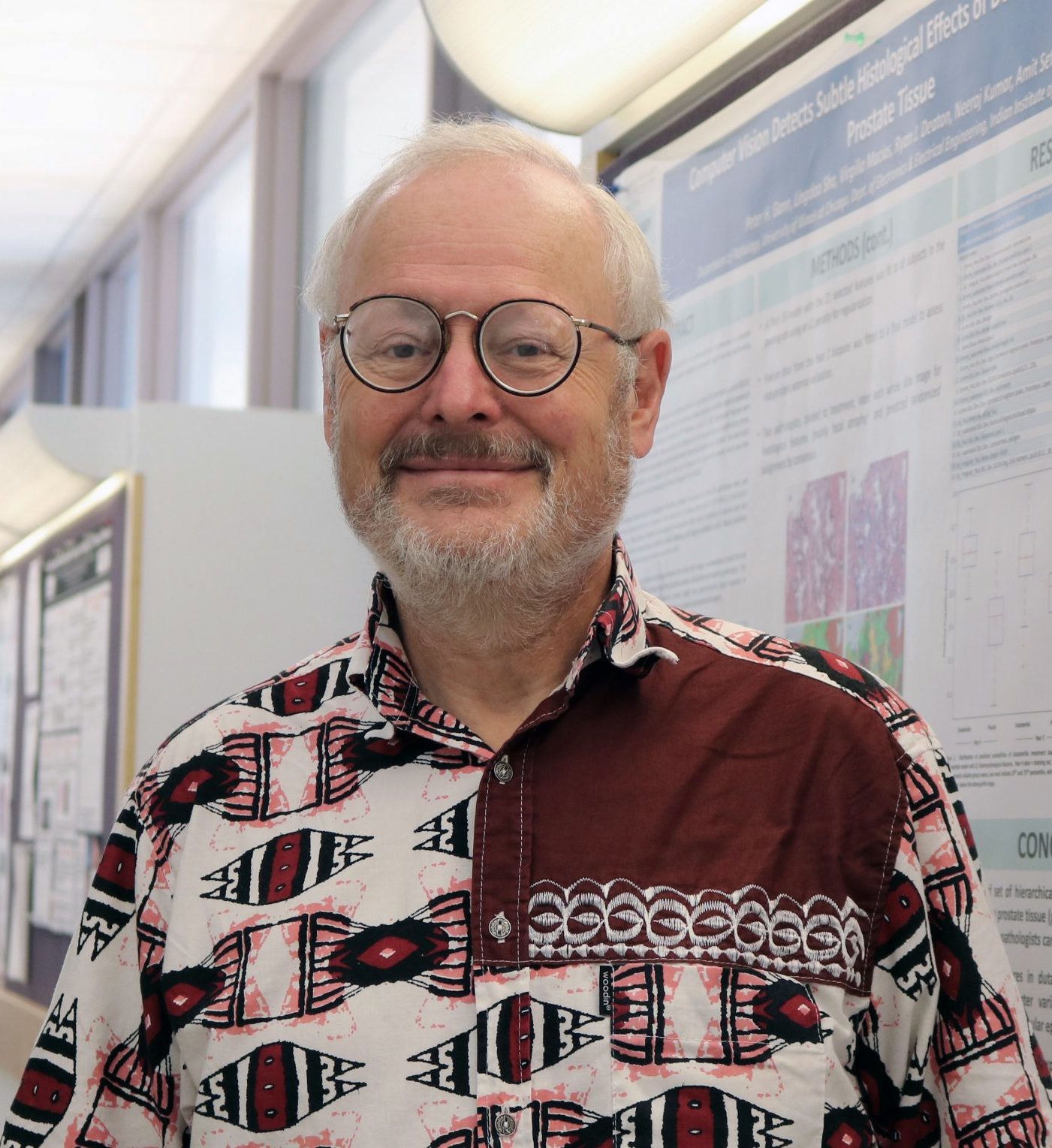
Standing in front of residents in a University of Illinois College of Medicine lecture room, UIC instructors regale their trainees on the science of pathology. The residents inside the room listen intently, but they are not alone. Maarten Bosland has created a way for pathology residents thousands of miles away, at Korle Bu Teaching Hospital in Accra, the capital of the West African nation of Ghana, to learn simultaneously.
Less than 20 of the 28 million people living in Ghana are pathologists. These medical professionals play a critical role in interpreting laboratory tests and evaluating cells, tissues and organs to diagnose diseases such as cancer. By looking under the microscope at the tissue sample taken from a patient’s tumor, a pathologist can determine whether it is benign or malignant. The limited number of pathologists in Ghana make the diagnostic assessment of cancer and other diseases difficult, and often life-threatening.
The Korle Bu Teaching Hospital has the only accredited pathology residency program in Ghana, said Bosland, DVSc, PhD, a University of Illinois Cancer Center and Center for Global Health member and pathology professor, who spent several weeks in the African country earlier this year. There currently are 15 residents being instructed by a few fellowship-trained pathologists, none of whom are subspecialty trained and all of whom have substantial other clinical and teaching duties. This, Bosland said, poses an enormous problem.
“In Africa, most of laboratory diagnostic tests are overseen by medical technicians,” he said. “We’re trying to provide Ghanaian pathology residents with educational opportunities available to our UIC residents.”
Using an online meeting and video conferencing software, Bosland has arranged simultaneous training of the UIC and Ghanaian pathology residents three to four times weekly, all in real time. Despite occasional power supply problems in Africa and bandwidth limitations, “the approach is surprisingly effective and enriching for residents on both sides of the ocean,” Bosland said.
“The quality of images online are excellent, and the voice-transfer has been delay-free,” Bosland said. “The connectivity problems have been infrequent, but we’re still working on a microphone hook-up so the Ghanaian students can ask questions.”
Through his many travels to Ghana over the past several years, Bosland has learned that pathologists are not the only health care professionals in dire need. The country has only about 50 dentists, so he is enlisting some faculty members from the UIC College of Dentistry to assist in training students at the Komfo Anyoke Teaching Hospital and the Kwame Nkrumah University of Science and Technology. And he is fostering partnerships between the Center for Global Health at the UIC College of Medicine and the two Kumasi universities in the fields of mental health, oncology, cervical cancer, primary care and advanced life support.
In 2017, Bosland expanded his West African research efforts to Nigeria, a country of 190 million people that, according to the World Health Organization, has the highest cancer death rate on the continent. About 10,000 cancer deaths are recorded annually, while 250,000 new cases are reported. Only 17 percent of African countries have sufficiently funded cancer control programs, according to the WHO.
Traditional herbal medicines are widely used in West Africa for a large range of disease conditions, including cancer. However, little information is known about their therapeutic efficacy and active ingredients. Many Nigerian and other West African academic centers are interested in studying the biological activity of the medicinal herbs, but their technology and human resources are limited and compromised by electrical power problems.
Bosland is leading a UIC consortium that will assist seven Nigerian universities in identifying medicinal herbs that will first be studied in vitro and further explored in animal models and eventually human clinical trials. Adverse effects of the herbs will be studied in the animals, as will toxicity. Anti-diabetic effects will also be determined in the animal models.
He is also conducting a separate study in Nigeria to determine the prevalence of prostate cancer and its histological characteristics in prostates collected at autopsy of men of different ages who have died from causes that were unrelated to prostate cancer.
“In the United States, prostate cancer is more prevalent in African American men and tests such as a PSA (prostate-specific antigen) is often used to detect the disease, but the test is not available in much of Africa,” said Bosland, who graduated from the University of Utrecht in the Netherlands with a doctoral degree in veterinary science and later, from the same university, a doctorate degree in experimental pathology. “For cancer in Africa, there is little in the way of effective diagnostic services, therapies, and preventative medicine.
“We want that to change, and we’re doing anything we can to help.”
